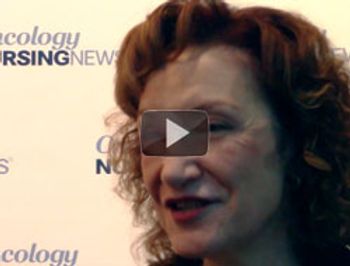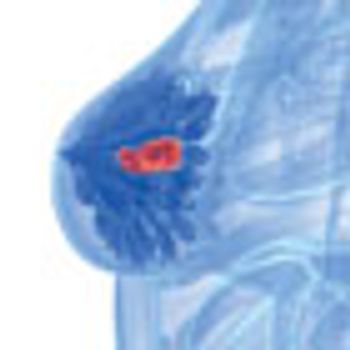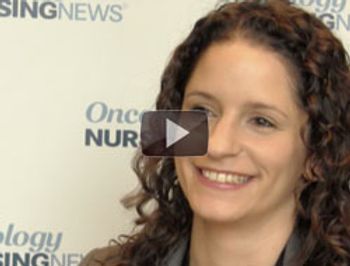
A new study has shown that postmenopausal women who had insulin abnormalities were at an increased risk for breast cancer regardless if they were overweight or normal-weight individuals.


A new study has shown that postmenopausal women who had insulin abnormalities were at an increased risk for breast cancer regardless if they were overweight or normal-weight individuals.

Anees B. Chagpar, MD, MSc, MA, MPH, associate professor of surgery (oncology), director, The Breast Center at Smilow Cancer Hospital at Yale-New Haven, program director, Interdisciplinary Breast Fellowship, assistant director, Diversity and Health Equity at Yale Cancer Center, explains how lifestyle changes that align with the US Cancer Prevention Guidelines can reduce one's breast cancer risk.

Results of a phase II study showed that women with small, stage I HER2-positive tumors who received a combination of lower-intensity chemotherapy and the targeted drug trastuzumab following surgery were highly unlikely to have the cancer recur within 3 years

Two recent studies outline the importance of nutrition in preventing obesity-related cancers as well as the potential benefits of a nutrition education intervention in preventing breast cancer recurrence.

Rowan Chlebowski, MD, PhD, discusses how losing 5 pounds, as seen in the Women's Intervention Nutrition Study, had a positive impact for breast cancer patients, especially whose disease was triple-negative.

Results of a large retrospective study of more than 20,000 women treated for early-stage breast cancer are shedding light on how much treatment may be too much for these early-stage cancers.

As one of the most significant predictors of hereditary breast and ovarian cancer, the BRCA1/2 genes have become the poster child for genetic testing. In the past 18 months, the floodgates for testing options have opened, as companies seek to enter the diagnostic market in the wake of the US Supreme Court's June 2013 ruling that "naturally occurring" human genes are a "product of nature" and cannot be patented, breaking Myriad Genetics' monopoly on BRCA1/2 gene testing.

Anees B. Chagpar, MD, MSc, MA, MPH, associate professor of surgery (oncology), director, The Breast Center at Smilow Cancer Hospital at Yale-New Haven, program director, Interdisciplinary Breast Fellowship, assistant director, Diversity and Health Equity at Yale Cancer Center, discusses a study that looked at patient perceptions of the impact of genetic testing for breast cancer risk on health insurance.

Jack Cuzick, PhD, a professor of epidemiology at Wolfson Institute of Preventive Medicine, discusses the side effects of tamoxifen that cause anxiety for patients.

Jean Weigert, MD, head of breast imaging for the Hospital of Central Connecticut, discusses the benefits of screening women who had normal mammograms but dense breasts.

New research has found that the overall survival of male patients with breast cancer has improved over time, but the improvement is not as good as it has been for female patients with breast cancer

New research presented at the 2014 San Antonio Breast Cancer Symposium has shown that women with triple-negative breast cancer (TNBC) are more likely to seek out information about their specific subtype and experience more fear, anxiety, and worry than women with other subtypes of breast cancer,

Tara Sanft, MD, assistant professor of medicine (medical oncology), medical director, Adult Survivorship, Yale Cancer Center Survivorship Clinic, discusses Yale's survivorship program, which is composed of three clinics.

Findings from a long-term analysis of the Women's Intervention Nutrition Study (WINS) show that the deaths of women with hormone receptor–negative breast cancers were reduced by up to 54% when they followed a program to reduce their dietary fat intake, which could provide benefit for patients with triple-negative breast cancer.

Erin W. Hofstatter, MD, assistant professor of medicine (medical oncology), co-director, Genetic Counseling Program, Yale Cancer Center, discusses a study to determine if perceived personal breast cancer risk was associated with adherence to healthy lifestyle habit.

Five years of tamoxifen continues to offer protection against breast cancer, reducing the risk of breast cancer by 29% in otherwise healthy women at high risk of the disease who have been followed now for 16 to 22 years.

Despite research findings that toxicities outweigh benefits when women over the age of 70 are treated with radiation for their early-stage breast cancer, the treatment remains commonplace 10 years later, a new study has found.

An increasing focus in oncology care is on survivorship and quality-of-life issues that arise once patients are living beyond treatment. For female breast cancer patients, important survivorship issues include sexual and reproductive health.

A group of researchers looking to better equip patients to be self-managers of their cancer have developed a new tool to help patients communicate their treatment goals more effectively.

A genomic test (also called a genomic assay) analyzes the activity of a group of genes linked to the risk of a particular disease.

Jessica Goldberg, MSN, adult gerontology nurse practitioner, fellow in palliative medicine, Memorial Sloan Kettering Cancer Center, discusses a study on creating a successful cancer self-management intervention for patients with breast cancer.

The poly (ADP-ribose) polymerase (PARP) inhibitor veliparib exhibits antitumor activity and is safe and tolerable on a continuous dosing schedule when used for the treatment of patients with BRCA-positive and BRCA–wild type tumors.

Talk with almost any breast cancer survivor, and they're likely to bring up the topic of "chemobrain," that fuzzy, murky state that patients blame for impaired memory.

Researchers have identified a new way to boost the enrollment of Latina patients with breast cancer in clinical trials via a culturally sensitive video, a tailored booklet, and the help of a patient navigator.

A systematic review of published results from 203 randomized clinical trials, involving more than 80 different integrative therapies, has yielded evidence-based recommendations for clinicians and their patients with breast cancer about which of these therapies may be most helpful to manage their symptoms.